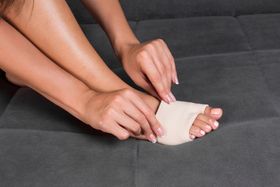Collagen and Plantar Fasciitis: What’s the Connection?
Learn more about the relationship between collagen and plantar fasciitis and how collagen can be used to treat associated symptoms.
Updated February 17, 2023
Pain associated with plantar fasciitis is due to the degeneration of the collagen fibers making up the plantar fascia. This mostly occurs on the inner side of the heel on the underside of the feet where the plantar fascia originates. Collagen is a network of tissue responsible for providing strength and elastic properties to joints, ligaments, and tendons. As one ages, collagen fibers break down at a faster rate than the body can repair, leading to overall collagen breakdown. Tendons and ligaments will lose their strength as collagen in the tissue breaks down, leading to ligament laxity, joint instability, and an increased risk of tendon ruptures.
Are Collagen and Plantar Fasciitis Related?
Microtears in the collagen fibers making up the plantar fascia are caused by overuse of the feet or due to use of incorrect footwear for extended periods of time. Without enough rest, the body is unable to repair the microtears before the next activity, which results in further damage. The plantar fascia is placed under stress and strain as you stand and walk daily. People who do endurance activities or activities that require jumping may see symptoms arise that are associated with the degeneration of collagen in the plantar fascia sooner than others.
How Can Collagen Relieve Foot Pain?
If your body cannot produce enough collagen to repair damaged tissue in the body, supplementing collagen will provide the body with enough protein to repair itself faster between activities and limit long term damage. Collagen also has other benefits such as supporting healthy hair, skin, and nails, alongside supporting the joint function required for normal mobility. Tissues in the body recovering from surgery or arthritic changes will benefit from the added collagen needed for repairing tissue. Plantar fasciitis can be treated with a host of home remedies that have been proven effective for managing pain and inflammation in the soles of the feet. Making use of orthotics, rest, and ice, coupled with stretching and strengthening exercises, can aid in managing your symptoms effectively.
You should consult with a medical professional if your symptoms are hindering your mobility, if the pain is uncontrollable or unbearable, or if numbness and redness are present alongside a warm sensation in the heel. These could all be signs of an infection or complication associated with the foot.
Related Articles

Orthotics for Helping With Back Pain
Babafemi Adebajo
February 17, 2023

Treating Metatarsalgia With Insoles and Other Orthotic Devices
Janik Sundstrom
January 30, 2024

Ankle Pain When Walking: Most Common Causes
Janik Sundstrom
December 9, 2024

Exercises to Help Heal Your Sprained Ankle
Babafemi Adebajo
December 17, 2024

Finding Comfort with Ice and Heat Therapy for Shin Splints
Janik Sundstrom
August 31, 2025
Related Posts
Babafemi Adebajo
CBD Cream for Plantar Fasciitis: Does It Help?
Janik Sundstrom
Best Herbs for Plantar Fasciitis
Babafemi Adebajo
How Glucosamine Helps With Plantar Fasciitis
Staff Writer
4 Signs Your Plantar Fasciitis Is Healing
Babafemi Adebajo



